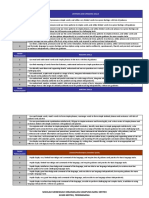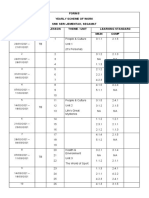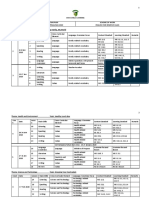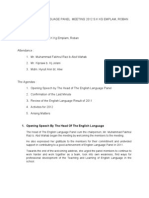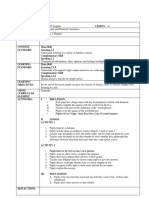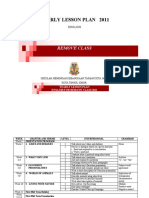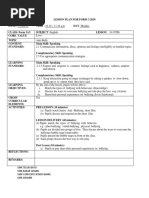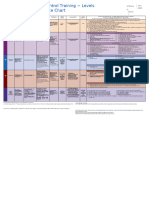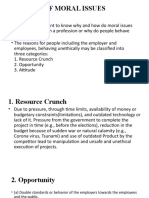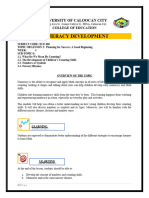Muet Scheme of Work
Muet Scheme of Work
Uploaded by
aireneCopyright:
Available Formats
Muet Scheme of Work
Muet Scheme of Work
Uploaded by
aireneOriginal Description:
Copyright
Available Formats
Share this document
Did you find this document useful?
Is this content inappropriate?
Copyright:
Available Formats
Muet Scheme of Work
Muet Scheme of Work
Uploaded by
aireneCopyright:
Available Formats
SCHEME OF WORK FOR MALAYSIAN UNIVERSITY ENGLISH TEST (MUET)
LEARNING AREAS
1. Social Issues
- Health
- Cleanliness
- Caring society
- Ageing
- Teenagers
- Family
- Social
organisation
- Juvenile
delinquency
- Vandalism
- Child abuse
- Abuse
LISTENING SKILLS
The syllabus seeks to
enable students to
understand various
types of oral texts in
social and academic
contexts such as
telephone
conversations,
meetings,
announcements, news,
documentaries,
lectures, presentations,
talks, and discussions.
SPEAKING SKILLS
The syllabus seeks to
enable students to
participate in social and
academic contexts such
as in conversations,
discussions, and
presentations.
Attention should be
drawn to the following:
sensitivity to
registers
degree of
formality
appropriateness of
discourse
grammatical
accuracy of output
Attention should be
drawn to the following:
sensitivity to
registers
degree of formality
appropriateness of
discourse
enunciation
intonation and stress
cohesion and
coherence
grammatical
accuracy
READING SKILLS
The syllabus seeks to
enable students to
comprehend linear
and non-linear texts.
Linear texts: prose
passages
Non-linear texts:
graphs, tables,
charts, and flowcharts.
The following skills
are emphasised:
i. skimming and
scanning
ii. deriving
meaning of
words from
context
iii. understanding
sense
relationship
within a sentence
between
sentences
within a
paragraph
between
paragraphs
- anaphoric
WRITING SKILLS
The syllabus seeks to
enable students to
write various types of
texts such as essays,
reports, term papers
and summaries, and
to observe the
appropriate
conventions.
The following skills
will be emphasised:
i. using
grammatically
correct and
appropriate
language
correct forms i.e.
tense, agreement,
word form,
sentence type,
etc.
ii. using a wide
range of
vocabulary and
expressions
appropriate for the
intended purpose
and audience
RESOURCES
1.
Arnaudet, M. L. and
M. E. Barrett, 1990,
2nd ed. Paragraph
Development,
Englewood Cliffs,
N.J.: Prentice Hall
Regents.
2.
Clanchy, J. and B.
Ballard, 1992. How to
Write Essays,
Melbourne; Longman
Cheshire.
3.
Davies, E. and N.
Whitney, 1984. Study
Skills for Reading,
London: Heinemann
Educational.
4.
Jordan, R. R. 1997.
English for Academic
Purposes, Cambridge:
Cambridge University
Press.
5.
Lim, J. C., 1999.
Malaysian University
English Test,
Selangor: Pustaka
Sarjana.
SCHEME OF WORK FOR MALAYSIAN UNIVERSITY ENGLISH TEST (MUET)
2.
Environmental
- Protection of
wildlife
- Recycling
- Pollution
- Preservation of
forest
- Greenhouse effect
- Reforestation
The following skills
are emphasised:
i. listening for main
ideas
ii. listening for
specific information
iii. note-taking
iv. paraphrasing
v. summarising
vi. inferencing
vii. predicting
viii. drawing
conclusions
ix. recognising
speakers attitudes,
roles and
relationships
x. listening critically
analysing and
evaluating
information
The following
communicative skills are
emphasised:
i. observing social
conventions in
interactions such as
greeting, leave-taking
and turn-taking
ii. managing a
discussion
initiating a
discussion
- maintain
- repair
- interrupt
- close
iii.
iv.
v.
3.
Politics
- System of
government
- Local politics
issues
- Malaysian
Political System
- Issues relating to
neighbouring
countries
and
cataphoric
references
vi.
vii.
viii.
ix.
asking for and
giving information
expressing
agreement and
disagreement
making suggestions
and
recommendations
stating and
justifying points of
view
giving reasons for
actions taken
expressing cause
and effect
relationship
presenting factual
information
discourse
markers e.g.
therefore,
however,
nevertheless, etc.
cohesive
devices e.g.
but, and,
because
grammatical
accuracy of
output
iv.
v.
vi.
vii.
viii.
ix.
x.
distinguishing
main ideas and
supporting
details
distinguishing
the relevant
from the
irrelevant
distinguishing
fact from
opinion
making
inferences
making
hypotheses
predicting
outcomes
drawing
sensitivity to
registers in
relation to
academic
contexts
iii. using the correct
mechanics
correct spelling,
capitalisation,
punctuation and
numbering
system
iv. generating and
developing ideas
for writing
thesis statement
and supporting
details
v. developing
coherent and
cohesive
paragraphs
leading to
extended writing
discourse
markers to link
ideas such as
whereas, on the
other hand, etc.
vi. writing effective
introductions
topic and
controlling ideas
vii. writing effective
conclusions
summary of the
6.
Lynch, T. and K.
Anderson, 1992.
Study Speaking,
Cambridge:
Cambridge University
Press.
7.
Robinson, P. C. (Ed),
1988. Academic
Writing: Process and
Product, ELT
Document 129.
8.
Rost, M., 1990.
Listening in
Language Learning,
London: Longman.
9.
Sidhu, G. K. and P. C.
Lim-Teoh. 1999.
MUET Malaysian
University English
Test, Shah Alam:
Mahir.
10. Smith, M. and G.
Smith, 1990. A Study
Skills Handbook,
Oxford: Oxford
University Press.
SCHEME OF WORK FOR MALAYSIAN UNIVERSITY ENGLISH TEST (MUET)
4.
5.
ASEAN, APEC,
IMF, Constitution
Economy
- Inflation
- Stock market
- International trade
Cultural
- Festivals
- Performing arts
- Cultural
Integration /
Assimilation
- Beliefs /
Traditions
x. giving opinions
xi. persuading
xii. drawing
conclusions
conclusions
transferring
information
from linear to
non-linear
texts, and viceversa
xii. paraphrasing
xiii. summarising
xiv. using the skills
of
intertextuality
knowledge
gathered from
other sources of
information to
arrive at
meanings or to
enrich meanings
xv. reading
critically
analyse and
evaluating
arguments
xi.
content
recommendations
viii. defining
concepts,
describing states
and processes,
and explaining
ideas
ix. comparing and
contrasting ideas,
classifying
information, and
establishing cause
and effect
x. summarising
information
selection of
relevant
information
paraphrase
xi. responding
critically and
appropriately to
information
contained in
linear and nonlinear texts
xii. developing
critical thinking
skills
presentation of
argument
effectively
evaluation of
ideas and
11. Wallace, M. J., 1980.
Study Skills in
English,
Cambridge:
Cambridge University
Press
12. Waters, M. and A.
Waters, 1995. Study
Tasks in English,
Cambridge:
Cambridge
University Press
13. Wong, S., 1981.
Summary Writing
Principles and
Practice (Rev. ed.),
Singapores: Pacific
Book Distributors.
SCHEME OF WORK FOR MALAYSIAN UNIVERSITY ENGLISH TEST (MUET)
6.
Religions
Academic
- Science / Arts
- Languages
- Form Six
- Science &
Technology (IT)
- Communications
opinions
justification of
stand
xiii. accessing,
collating,
organising, and
presenting
information
information from
printed and
electronic
sources
organisation of
information
according to
chronological
order, spatial
order, etc.
xiv. citing
documents
bibliographic
entries
references
following
specific
conventions
xv. drafting, revising
and editing
note-taking,
planning, writing
outlines, writing
drafts, rewriting
and proof
reading
SCHEME OF WORK FOR MALAYSIAN UNIVERSITY ENGLISH TEST (MUET)
You might also like
- Open World C1 Advances Workbook W - F Answers With AudioDocument8 pagesOpen World C1 Advances Workbook W - F Answers With AudioJoaquín Ruiz MorínNo ratings yet
- RPT Bahasa Inggeris Form 4 2024Document16 pagesRPT Bahasa Inggeris Form 4 2024azwaninajihah95No ratings yet
- Borang Transit F3 PenjajaranDocument4 pagesBorang Transit F3 PenjajaranadabirmNo ratings yet
- RPT Bahasa Inggeris PeralihanDocument1 pageRPT Bahasa Inggeris PeralihanEmir Abu Khalil33% (3)
- Form 5 Sow SummaryDocument5 pagesForm 5 Sow SummarySyamimi ZolkepliNo ratings yet
- Muet Scheme of Work 2023 2024Document6 pagesMuet Scheme of Work 2023 2024lynn mohamad31100% (3)
- Sow Form 4Document140 pagesSow Form 4farisia100% (1)
- SMK Mat Salleh Project-Based Learning PlanDocument4 pagesSMK Mat Salleh Project-Based Learning PlanGaman Kodou100% (1)
- SPM 2021 Introduction To f4 2021Document27 pagesSPM 2021 Introduction To f4 2021Nik Rasha100% (2)
- Rancangan Pelajaran Tahunan Peralihan Bahasa InggerisDocument9 pagesRancangan Pelajaran Tahunan Peralihan Bahasa InggerisAisyah MsaidNo ratings yet
- Sow Remove ClassDocument186 pagesSow Remove ClassJoy Moss50% (2)
- English Language 1119/4 Listening: - Form 5 SPM Trial ExaminationDocument6 pagesEnglish Language 1119/4 Listening: - Form 5 SPM Trial ExaminationROBIATUL ADAWIAH BINTI HAMZAH MoeNo ratings yet
- Data Pernyataan Tahap Penguasaan Bahasa Inggeris Tingkatan T1 2019 Kemahiran TP TafsiranDocument4 pagesData Pernyataan Tahap Penguasaan Bahasa Inggeris Tingkatan T1 2019 Kemahiran TP Tafsiranamsy1224No ratings yet
- KBAT Lesson Plan Year 6Document2 pagesKBAT Lesson Plan Year 6Tom Kurtis Yorke83% (6)
- Jsu SPM (Paper 2) EnglishDocument1 pageJsu SPM (Paper 2) Englishmissnettebaltz100% (2)
- Program Intervensi Panitia BI 2017Document1 pageProgram Intervensi Panitia BI 2017santhini85100% (2)
- Muet Lesson Plan New 2023Document2 pagesMuet Lesson Plan New 2023Melly100% (1)
- Muet Lesson PlanDocument3 pagesMuet Lesson PlanRothinam Nirmala100% (3)
- Muet Cefr 2021 Drilling Model Worksheets 3 Sets Part 5 Gapped Text Reading PaperDocument7 pagesMuet Cefr 2021 Drilling Model Worksheets 3 Sets Part 5 Gapped Text Reading PaperKAMAHABZANIZAM BIN ABD KADIR Moe100% (1)
- PDPR Form 5 2021 Unit 1 - It's PersonalDocument3 pagesPDPR Form 5 2021 Unit 1 - It's PersonalteachernizzNo ratings yet
- Muet Content and Learning StandardDocument11 pagesMuet Content and Learning StandardSiti Rosnani Hassan100% (1)
- Choral Speaking FormsDocument10 pagesChoral Speaking FormsRaihan ShamsudinNo ratings yet
- English Language Panel Anual Meeting 2012 (Minit Mesyuarat 1rst)Document5 pagesEnglish Language Panel Anual Meeting 2012 (Minit Mesyuarat 1rst)Ehsan HalimNo ratings yet
- Fair's Fair: Narinder DhamiDocument7 pagesFair's Fair: Narinder Dhamimazlin murat67% (3)
- Form 1 Environment SpeakingDocument4 pagesForm 1 Environment Speakingroshdan690% (1)
- Muet Lesson PlanDocument3 pagesMuet Lesson PlanMohd AirulazlanNo ratings yet
- Form 1 Lesson 41Document2 pagesForm 1 Lesson 41WISH1441No ratings yet
- RPT English Peralihan 2021Document4 pagesRPT English Peralihan 2021TAY FARIDAH67% (3)
- Erph Form 1,2,3,4, 5Document3 pagesErph Form 1,2,3,4, 5Azmi RahmanNo ratings yet
- RPT English Form 5 2023Document2 pagesRPT English Form 5 2023Nursabirah Idris100% (1)
- OMG 5 English Form 2 - Unit 1Document7 pagesOMG 5 English Form 2 - Unit 1maaran sivam100% (1)
- Muet Yearly Scheme of Work 2024Document19 pagesMuet Yearly Scheme of Work 2024Nursa'adah100% (4)
- MUET My Way... : Marking Scheme Muet 800/4 Q1 & Q2Document9 pagesMUET My Way... : Marking Scheme Muet 800/4 Q1 & Q2Heidi SallehNo ratings yet
- Detailed Scheme of Work Form 6Document3 pagesDetailed Scheme of Work Form 6Wanie Abas100% (1)
- Huraian Sukatan Pelajaran Malaysian University English Test (Muet-Cefr) Tingkatan Enam Atas Dan Bawah Pra Universiti Semestar 1, 2 & 3Document7 pagesHuraian Sukatan Pelajaran Malaysian University English Test (Muet-Cefr) Tingkatan Enam Atas Dan Bawah Pra Universiti Semestar 1, 2 & 3Azmi RahmanNo ratings yet
- Pro-Elt Briefing For TrainingDocument18 pagesPro-Elt Briefing For TrainingCikgu Siti100% (1)
- Form 4 Cefr Sample Lesson Plan TemplateDocument2 pagesForm 4 Cefr Sample Lesson Plan TemplateZubaidah Jamaluddin100% (1)
- 2021 Form 5 English Language Daily Lesson Plan English Language Panel of SMKDocument2 pages2021 Form 5 English Language Daily Lesson Plan English Language Panel of SMKkittyriri cam100% (4)
- Lesson Plan For Form 3 CivicDocument3 pagesLesson Plan For Form 3 Civicchristy riza100% (4)
- Muet Module WritingDocument36 pagesMuet Module WritingAhmad Fadzil100% (8)
- KERTAS KERJA English Week 2015Document3 pagesKERTAS KERJA English Week 2015asnida78100% (2)
- An Introduction of KBAT Activities in The EnglishDocument20 pagesAn Introduction of KBAT Activities in The EnglishRezaq Fariz75% (4)
- F1.Lesson 20 ReadingDocument2 pagesF1.Lesson 20 ReadingJamunaCinyoraNo ratings yet
- Lesson Plan KbatDocument12 pagesLesson Plan KbatNur HafezaNo ratings yet
- Daily Lesson Plan Ts25: Teaching and Learning StrategiesDocument2 pagesDaily Lesson Plan Ts25: Teaching and Learning StrategiesMummy HartiniNo ratings yet
- Speaking Test 2020 Form 4 CefrDocument3 pagesSpeaking Test 2020 Form 4 CefrLynda100% (1)
- SPM Writing ASSESSMENT SCALEDocument4 pagesSPM Writing ASSESSMENT SCALEIswal Hamizah Jalis100% (1)
- Civic Lesson - HappinessDocument2 pagesCivic Lesson - HappinessVithya Subramaniam100% (1)
- Program Intervensi BIDocument1 pageProgram Intervensi BILotus Mines0% (1)
- Unit 5 A Place To Call HomeDocument10 pagesUnit 5 A Place To Call HomeAleh TiongNo ratings yet
- Edited KSSM English Form 1 ThemesDocument1 pageEdited KSSM English Form 1 Themesscling50% (2)
- Unit 3 Wild WeatherDocument24 pagesUnit 3 Wild WeatherMelissa SubalNo ratings yet
- Features of Cefr SPM Writing Mark SchemeDocument1 pageFeatures of Cefr SPM Writing Mark SchemevanessaNo ratings yet
- CEFR Alligned Lesson Plan Template For Form 2 PPDPPDocument6 pagesCEFR Alligned Lesson Plan Template For Form 2 PPDPPJamunaCinyora100% (4)
- Kertas Konsep Story TellingDocument23 pagesKertas Konsep Story TellingNURUL NATRAHNo ratings yet
- RPT Bahasa Inggeris KSSM Tingkatan 5 2021Document7 pagesRPT Bahasa Inggeris KSSM Tingkatan 5 2021Jovinah Jubili50% (2)
- University of Madras: Syllabus For The Courses On Softskills (W.e.f. 2007 2008)Document33 pagesUniversity of Madras: Syllabus For The Courses On Softskills (W.e.f. 2007 2008)seema sweetNo ratings yet
- Teaching Reading SkillDocument9 pagesTeaching Reading SkilllethanhtuhcmNo ratings yet
- Semester 1 Grade 12 SyllabusDocument5 pagesSemester 1 Grade 12 SyllabusDarryl Lee SalterNo ratings yet
- Syllabus - Theories of Language Teaching and Learning - October 2014Document11 pagesSyllabus - Theories of Language Teaching and Learning - October 2014Anna Nguyễn0% (1)
- Department: Program:: Course Code: Prerequisite: I. Institutional VisionDocument5 pagesDepartment: Program:: Course Code: Prerequisite: I. Institutional VisionBenjTomolNo ratings yet
- Theories of Educational LeadershipDocument34 pagesTheories of Educational LeadershipNelyn Jill Obejero100% (1)
- A Historical Review of Physical Education in China (1949-2020)Document9 pagesA Historical Review of Physical Education in China (1949-2020)shagunmalik2405No ratings yet
- EreDocument43 pagesEreSujan AcharyaNo ratings yet
- Ideological Rationale With Special Reference To Sir Syed Ahmed KhanDocument6 pagesIdeological Rationale With Special Reference To Sir Syed Ahmed KhanSajid Riaz Sumra100% (1)
- SavedrecsDocument117 pagesSavedrecsyeannysNo ratings yet
- Nikunj ResumeDocument1 pageNikunj ResumeNikunj BindalNo ratings yet
- SMMC-THESIS-PAPER Educ Chapter123Document24 pagesSMMC-THESIS-PAPER Educ Chapter123Adorio JillianNo ratings yet
- 476chart-2023Document2 pages476chart-2023Susilawati ESNo ratings yet
- Variety of Moral Issues Types of InquiriesDocument17 pagesVariety of Moral Issues Types of InquiriessamanNo ratings yet
- Lesson Plan 9Document5 pagesLesson Plan 9Toqeer TumraniNo ratings yet
- Lesson PlanDocument3 pagesLesson PlanJerome TumayaoNo ratings yet
- REAP ARIF Webinar GuidelinesDocument2 pagesREAP ARIF Webinar GuidelinesEnglevert ReyesNo ratings yet
- Ece 006 - Module 3Document9 pagesEce 006 - Module 3Desiree IsidroNo ratings yet
- Mr. MULUKEN G8 - PVA ANNUAL PLANDocument10 pagesMr. MULUKEN G8 - PVA ANNUAL PLANMuluken gebeyehuNo ratings yet
- Cmd. 00427992039203 Cmd. 00427992039203 Cmd. 00427992039203 Cmd. 00427992039203Document2 pagesCmd. 00427992039203 Cmd. 00427992039203 Cmd. 00427992039203 Cmd. 00427992039203Salman HyderNo ratings yet
- Contemporary - DelanteDocument26 pagesContemporary - DelanteMensaherang Nezuko ChanNo ratings yet
- Resume (Alyza Caszy Umayat)Document1 pageResume (Alyza Caszy Umayat)Alyza Caszy UmayatNo ratings yet
- PSIR Answer Writing Module 2022: Test 5Document30 pagesPSIR Answer Writing Module 2022: Test 5Suraj KottawarNo ratings yet
- April Tucker Meets Her Goals As Sms Field Hockey CoachDocument1 pageApril Tucker Meets Her Goals As Sms Field Hockey Coachapi-248185821No ratings yet
- Heri Albertorio Curriculum VitaeDocument2 pagesHeri Albertorio Curriculum Vitaeapi-237187907No ratings yet
- Wilson-Literature and KnwoledgeDocument9 pagesWilson-Literature and KnwoledgeIsis UrgellNo ratings yet
- Education ProgramDocument4 pagesEducation ProgramFarhat KhanNo ratings yet
- University of Nebraska Men's Gymnastics Media GuideDocument67 pagesUniversity of Nebraska Men's Gymnastics Media GuideKellyKeoghNo ratings yet
- Implant DentistryDocument11 pagesImplant DentistryDentist ChandraShekarNo ratings yet
- SPEAKING Placement TestDocument4 pagesSPEAKING Placement TestFABIOLA AYDÉE REYES QUEZADANo ratings yet
- Ed 9 HandoutsDocument6 pagesEd 9 HandoutsJoane ColoniaNo ratings yet
- Lesson Plan-Q3 h9 PDF First Aid LearningDocument1 pageLesson Plan-Q3 h9 PDF First Aid LearningJayfor RabongNo ratings yet
- TG Sinugbuanong Binisaya BoSY CRLADocument14 pagesTG Sinugbuanong Binisaya BoSY CRLAmajessa.balendresNo ratings yet
- Rational BeingDocument2 pagesRational BeingHarris AcobaNo ratings yet


